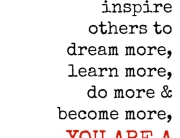 Having a business analyst to assist in maintaining a high level of accountability within an organization is a beautiful experience. The role or position of the business analyst is crucial in bridging the gap between the business and stakeholders. They are change agents that gather requirements from the stakeholders, clarify goals and break down communication barriers. Business analysts can quickly evaluate requirements to ensure that the request is a good business decision. Additionally, they build relationships and set expectations for the stakeholders. In smaller organizations the project manager may serve as the business analyst as well. Business analyst work within all levels of the business to collect data and to present facts. If they are solid leaders, they will also be advocates of accountability. BASF’s old tagline states, “we don’t make a lot of the products you buy, we make them better”. I don’t know if that’s true, but a good business analyst makes our jobs easier. Conversely, a poor business analyst will not only mitigate the effectiveness of the team they cause chaos. The project will be in jeopardy if the person lacks business skills and is incapable of building relationships.
Having a business analyst to assist in maintaining a high level of accountability within an organization is a beautiful experience. The role or position of the business analyst is crucial in bridging the gap between the business and stakeholders. They are change agents that gather requirements from the stakeholders, clarify goals and break down communication barriers. Business analysts can quickly evaluate requirements to ensure that the request is a good business decision. Additionally, they build relationships and set expectations for the stakeholders. In smaller organizations the project manager may serve as the business analyst as well. Business analyst work within all levels of the business to collect data and to present facts. If they are solid leaders, they will also be advocates of accountability. BASF’s old tagline states, “we don’t make a lot of the products you buy, we make them better”. I don’t know if that’s true, but a good business analyst makes our jobs easier. Conversely, a poor business analyst will not only mitigate the effectiveness of the team they cause chaos. The project will be in jeopardy if the person lacks business skills and is incapable of building relationships.
How does accountability fit in our lives? Do we have accountability partners (BA’s) to draw out the requirements of our hearts and minds to help us reach our goals? How can we go to the next level without having an accountability partner to challenge us? Are some of us so arrogant that we think we do not need accountability?
I don’t know about you, but having an accountability partner is a beautiful thing!
“The ancient Romans had a tradition: whenever one of their engineers constructed an arch, as the capstone was hoisted into place, the engineer assumed accountability for his work in the most profound way possible: he stood under the arch.” – Michael Armstrong






